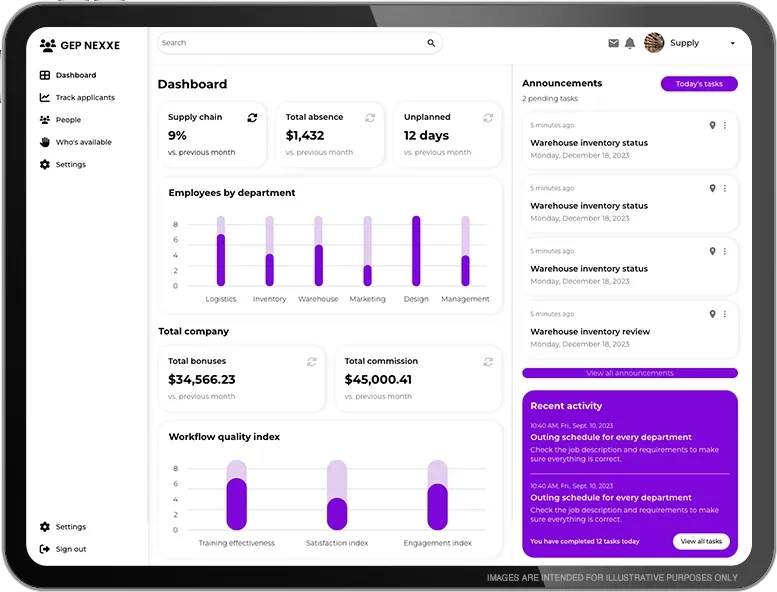Artificial intelligence (AI) has emerged as a transformative force, revolutionizing the supply chain industry and enabling businesses to drive efficiency, visibility, risk mitigation, and better decision-making. Generative AI, in particular, offers significant innovation opportunities, recognized by CEOs.
Procurement and supply chains are ideal for applying generative AI due to their complexity and interconnectedness. By leveraging GenAI, enterprises can optimize and streamlines various aspects, including sourcing, procurement, forecasting, inventory management, and logistics optimization.

Inundated by Challenges
Supply chain pros must make decisions that impact the company bottom line, amid numerous challenges. Decisions based on short-term cost impact can hinder long-term goals and sustainability.
Managing Supply Chain Complexity
Supply chains are complex networks of people, processes, and technology. Managing these complexities is crucial for smooth operations, meeting customer demands, and complying with regulations.
Efficiency Hindered by Organizational Silos
Disconnected functions and silos block collaboration and information sharing, obscure the big picture, and limit supply chain orchestration — the core of effective supply chain management.
The Price of Poor Data
Supply chains generate vast amounts of unstructured data, with around 80% being unmanaged. Inefficient data management causes missed opportunities, bad decisions, inefficiency, and poor risk management.
Controlling Cost Amid Volatility
Balancing cost, quality, and delivery is challenging due to price volatility, currency fluctuations, and market dynamics. Proactive supplier management and market intelligence are key to controlling costs.
Lack of Agility Fuels Disruptions
Disruptions cause material shortages, delays, and higher costs. A lack of agility in procurement and supply chain management worsens the impact, making it harder for organizations to respond effectively.
Balancing Efficiency and Sustainability
Balancing sustainability and ethics with cost and efficiency is tough, but the pressure is high and organizations must address them through responsible sourcing, supply chain transparency and fair labor practices.
4 Key Ways AI Strengthens Supply Chain Management
Generative AI can revolutionize business with AI-powered supply chain and procurement-specific applications that equip companies to make advancements and achieve new levels of efficiency.
Generative AI systems can analyze vast amounts of data, uncover patterns and generate actionable insights to enhance decision-making and operational efficiency. In addition, generative AI enables the creation of synthetic data and models, facilitating simulations, scenario planning, and risk analysis and sensing, thereby improving supply chain resilience and adaptability.
These systems understand and generate natural language text in a conversational manner, bridging the gap between machine and human understanding and eliminating the need for structured information. This enhances the user experience and fosters seamless communication, all while streamlining the process of exchanging information.
Generative AI tools (such as ChatGPT) not only provide information and facts thanks to their training on diverse text data sources, but they also learn from these interactions, effectively building institutional knowledge. With each conversation, these tools absorbs new insights and perspectives, constantly expanding their understanding and refining responses.
Generative AI/ChatGPT understands and retains context during conversations, remembering and referring to previous messages to facilitate coherent and meaningful interactions. It extends beyond individual conversations — by engaging with users across various domains and industries, ChatGPT gains insights into different aspects of the supply chain to provide nuanced and relevant responses, facilitating effective communication and decision-making.
How Does Generative AI Fit Into Supply Chains?
By leveraging machine learning and natural language processing, generative AI assists procurement and supply chain teams in problem-solving and information synthesis, improving productivity and enabling focus on higher-value projects. While human judgment remains central, AI enhances skills and fosters creativity. Here are a few evolving use cases:
Generative AI enables users to interact with only one system, to which they can ask any supply chain question through a chat-like interface. Users no longer have to access multiple systems to hunt for and extract relevant information — it’s all there in one place, right away, at your fingertips.
Generative AI addresses anomalies in real-time, as intelligent systems can analyze vast amounts of data and highlight issues swiftly so users can manage toward the exceptions. Intelligent automation enables faster identification of patterns, leading to improved process optimization and quality control. Furthermore, automating repetitive tasks increases productivity for faster time to market.
Generative AI helps identify suppliers that align with specific environmental, social and governance (ESG) criteria, ensuring compliance with corporate social responsibility goals and ethical supply chain principles.
Generative AI supports building and managing supplier relationships and value by providing insights into effective negotiation strategies, contract management and dispute resolution. It can assist in maintaining open lines of communication and facilitating collaborative engagements with suppliers.
Generative AI-based supply chain management helps identify and mitigate supply chain risks. It can analyze data related to geopolitical events, natural disasters, supplier disruptions or market fluctuations to provide early warnings, risk assessment and suggestions for contingency planning.
Generative AI can identify patterns and issues within the supply chain, enabling proactive measures to address potential disruptions. It facilitates global logistics improvements by optimizing transportation routes, warehouse operations and inventory management.
Supply chain management AI can analyze supplier profiles, performance metrics and feedback from previous interactions to provide recommendations based on specific requirements and criteria.
It helps procurement professionals generate purchase orders by understanding the user's requirements and translating them into accurate and comprehensive purchase order details, including quantities, specifications, delivery dates and pricing.
By analyzing demand patterns, historical data and market trends, generative AI can contribute to inventory optimization. Supply chain AI solutions can provide recommendations on inventory levels, reorder points and forecasting techniques to ensure efficient inventory management and minimize stockouts or excess inventory.
By continuously interacting with users, generative AI systems can capture valuable insights, learn from the expertise of professionals and accumulate institutional knowledge. It acts as a virtual assistant for procurement and supply chain professionals, providing real-time guidance, answering queries, and offering training on best practices, industry regulations, and emerging trends.


















